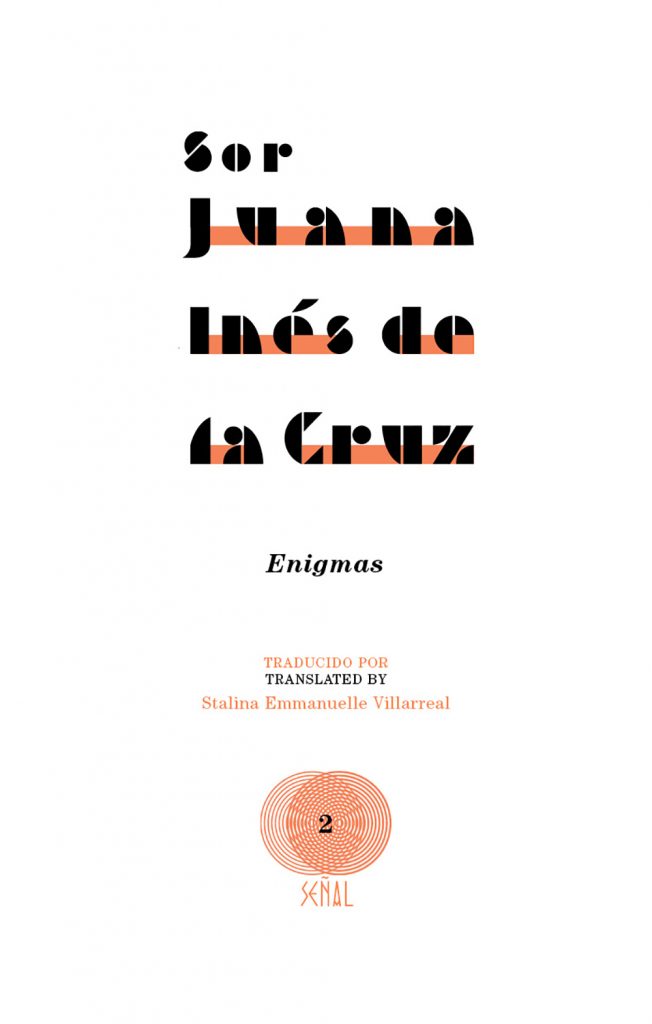¿Cuál es aquella homicida
que piadosamente ingrata
siempre en cuanto vive mata
y muere cuando da vida?
* * *
What is that slayer-strife
who piously naughty
when living, slaughters
and dies upon granting life?

¿Cuál es aquella homicida
que piadosamente ingrata
siempre en cuanto vive mata
y muere cuando da vida?
* * *
What is that slayer-strife
who piously naughty
when living, slaughters
and dies upon granting life?
Sor Juana is a rigorous thinker letting rip a 'vulgar wow.'
Kristin Dykstra
The twenty quartets comprising Sor Juana Inés de la Cruz’s Enigmas were written for a group of learned Portuguese nuns in 1693 and were only discovered in 1968. Each enigma is structured around wordplay and poses a paradoxical, undecipherable riddle, one whose possible solution readers continue to ponder.
Sor Juana Inés de la Cruz (1651–1695) was Colonial Mexico’s foremost intellectual. The self-taught illegitimate child of a Spanish captain and a Mexican criollo woman, she was raised in an hacienda in Amecameca, on the outskirts of Mexico City. As a teen, she was sent to the viceregal court in the city, where she became lady-in-waiting and a protégé of the Vicereine Leonor Carreto. Having chosen to continue to pursue knowledge over marriage, she entered the monastery of the Hieronymite nuns in 1669, where she remained cloistered until her death and wrote many of her most significant works, including the long poem “First Dream” and “Response of the Poet to the Very Eminent Sor Filotea de la Cruz,” an epistolary defense of a woman’s right to devote herself to scholarly pursuits. Her Baroque, proto-feminist writing—avidly displaying an acute understanding of the intricacies of power relations between the sexes and the Old and New Worlds—coincided with the Spanish Golden Age and garnered her a sizable readership in Spain and the Americas. Sor Juana was ultimately silenced by ecclesiastical authorities, yet her prodigious intelligence continues to incite minds.
Stalina Villarreal offers new translations to activate English ears. She recombines the sobriety granted to Sor Juana’s necessary resistance with energies from her own time and place. The maximalist transnational mind submits that canonical rhyme can be retaken in translation, through flirtations amongst cultural registers. Beloved ancestral intellectual, pop icon, always la peor de todas, Sor Juana is a rigorous thinker letting rip a “vulgar wow.”
Kristin Dykstra
...legendary proto-feminist bard of seventeenth-century Mexico...
Susan Bernofsky
...such writing unfolds in an eternal present, remaining relevant, ongoing, and interactive every time a reader chooses to read it.
Kathleen Rooney, Chicago Tribune
Stalina Emmanuelle Villarreal is a Mexican and Chicana poet, a translator, and an instructor of English at Houston Community College. Her translations have appeared in Sèrie Alfa: Artiliteratura, Eleven Eleven, and Mandorla. Her work can be found in Papeles de Manscupia, El Vértigo de los Aires: Encuentro Iberoamericano en el Centro Histórico 2009, and Her Kind. Her visual poetry was part of the Antena Books exhibit at University of Houston’s Blaffer Art Museum during Spring 2014.
ISBN: 978-1-937027-77-3
Chapbook
staple-bound. 32 pp, 5.25 x 8.25 in
Publication Date: December 01 2015
Distribution: Asterism Books (US)
Series: Señal #2